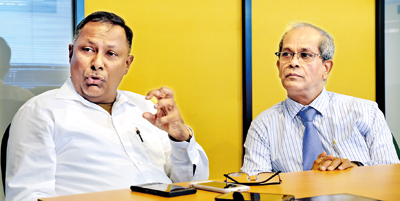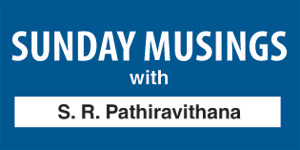“A roof for every federation” – the Subramanium dream

Suresh Subramanium – the man elect as the new NOCSL chief will be looking to usurp the inner knowledge of the Secretary General Maxwell de Silva who was re-elected. (Pic Amila Gamage)
There are certain remarkable similarities between Ana Punchihewa, who really turned a leaf in the game of cricket as far as its transformation is concerned, and Suresh Subramanium who has just taken up the challenge to guide the progress reports of 31 sports federations affiliated to the National Olympic Committee of Sri Lanka (NOCSL).
Punchihewa came to cricket from golf, in which he was an avid participant. While homing in on cricket, a sport he was not that familiar with, he felt it was a new experience. Yet, he was bold enough to see through the challenges and cut a niche in the game, which is now time-tested.
Subramanium’s first love is tennis and remains the same, just as what golf meant to Punchihewa. He had a three-month crash course to learn the nitty-gritty of NOCSL politics and its survival, and now he is the President of the NOCSL – one of the most powerful chairs in Lankan sports or, for that matter, globally.
Yet, the smartest similarity lies here. When Punchihewa took over the reins, he proclaimed Sri Lanka would be “the best Test playing nation by the year 2000”. Now it’s among folklore. Similarly, Subramanium has opted to launch his Olympic episode with a catch line – “A roof over all federations”.
However, the similarities end there. What Punchihewa proposed and executed is now history, while Subramanium has opened his front gates and is about to drive the vehicle on to the main road. It is now up to him to drive the vehicle to his desired destination.
During conversation with us, at one point Subramanium quipped, “If cricket could do it in 1996, why can’t we do it now to the NOCSL”.
He says he was surprised to see the number of sports federations affiliated to the Olympic system, some of them not having their own desk and chair to conduct their day-to-day business. He said, “Some are operating from their own residences. Like I said, we have to find a roof for every sports organisation especially, less popular sports. They are the ones who are going to win us medals. There is no point in us sitting here and saying I am the president and here is my secretary general. The important fact is that, it will be the result which would read as our success or failure. I was not a part of the NOCSL all these years. Why did they choose me? It is because I produced results at the Tennis Federation. Similarly, Hemasiri Fernando, who handed over the reins to me, may have seen my capabilities through my onfield performance.”
Pointing out that he had been in the Olympic system for hardly three months, The Sunday Times Musings asked him what he knew about olympism. He replied: “In the run up to the election, I met up with 21 or 22 sports federations, and had a one-on-one with every one of them. We spoke of medal prospects and qualifying. The NOCSL is not there to do grassroots level work. That has to be done by the federations and the Ministry of Sports. We look after the high performance aspects of it.
“We spoke to the membership and identified their present problems. In fact, I have already spoken to the Iranian Federation. I’ve had a very good rapport with them for a long time, through my work in the international tennis circuit. Then I spoke to the Summer Olympic Federation President Ricky Bitty. He was also the former president of the International Tennis Federation. Soon I would be meeting them in Lausanne, where I would extend one of my business visits. Through dialogue, a lot could be accomplished. First, we must identify what the membership wants and then we must try to cater to the prevailing need. When you give them what they need, then it is up to them to translate them into positive results. If not, someone might turn around and say the chair has failed to cater to our needs.”
Both Subramanium and NOCSL Secretary General Maxwell de Silva pointed out there should be systems set in place at the NOCSL. They were of the view that the new team is young and everyone seems to be enthusiastic. This is one of the factors that would hold in good stead for them with regard to the systems and financial management. “This means checks and balances for office staff, the membership and federations alike. The federations have a certain obligation to the NOCSL. At the end of the day, if 31 federations are not performing, we are failing in our task,”the new NOCSL chief said.
Then Subramanium came up with the notion that, being ‘hands-on’ is one way of being prompt. “I proposed the NOCSL Committee should meet at least once a month and review the progress. There is no point in ascertaining as to who is responsible for a certain situation. I say, everyone one of us is accountable. We have decided to appoint a constitutional committee, so that, we can have financially qualified personnel heading the treasury and the financial division. I was very disappointed there were no questions asked about the finances. Then, while approving the finances, one of the members suggested a committee be set up to go through all the allegations levelled against the previous membership, and report back to us. There, they would table those findings at a special general meeting to be held soon. On March 5, we are scheduled to have our first committee meeting, when I will appoint a three-member committee to study the finances. No matter who it is, if we cannot correct our mistakes, there is no way forward.”
 Subramaniam is of the opinion that to achieve the desired results, one must always work backwards. If the target is medals in 2020, one must work backwards and work through the nitty-gritty on how to accomplish it. “There are three events coming up. The Commonwealth Games, the Asian Games and the Junior Olympics later this year. If we win any medals, the accolades should go to the people who are involved with it. But, I have to ensure that, from there onwards, things should move my way, so we have to work backwards.”
Subramaniam is of the opinion that to achieve the desired results, one must always work backwards. If the target is medals in 2020, one must work backwards and work through the nitty-gritty on how to accomplish it. “There are three events coming up. The Commonwealth Games, the Asian Games and the Junior Olympics later this year. If we win any medals, the accolades should go to the people who are involved with it. But, I have to ensure that, from there onwards, things should move my way, so we have to work backwards.”
“If an athlete fails to win a medal at an event, they blame the athlete and the coach right away, but it should not be that. We must always look at the bigger picture. I remember, tennis star Andy Murray had 31 wildcards before making the grade, which is the same with so many others who have reached stardom in tennis. While working with the international tennis, I know where the cutoff mark is, and it is not difficult for us to arrange a wildcard for a deserving Lankan tennis player. We do that through personal touch.
“This is something that we must encourage. We must strive to get into the working committees of international sports bodies. But this is not sufficient. Once you are in, you must also work hard and become a member who mattes, one who is respected and would promote the Lankan point of view. Then, automatically, the players get better opportunities, which would not have come in the normal course of activity. We must see that members of all sports federations will strive to achieve this. He pointed out that, in Athletics, someone might be at the Asian circuit, but at FINA (the International Swimming Federation) there is no one. We should strive to have an influential member in every working xommittee in the international sports circuit.


